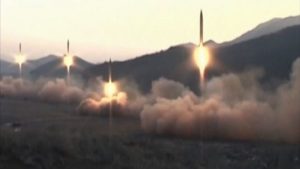North Korea’s Rational Nuclear Strategy
A favorite tactic of U.S. propaganda is to label a foreign adversary “crazy” to justify a military attack — as is now happening with North Korea’s Kim Jong Un although his nuclear program really makes logical sense, observes Ted Snider.
The “insanity” label that America attaches to North Korea has a lot of political utility. First, it colors the interpretation of everything North Korea does. The consideration of a rational motivation for undesirable actions can be prevented: the actions are assumed to be crazy.
Secondly, it makes the target of blame clear. Thirdly, and most importantly, it justifies the claim that rational discussion and diplomacy are pointless and misguided. Since the regime is irrational, it is incapable of listening to reason: the only approach that works is threats, military action and regime change.
There is a long American history of calling opponents crazy. At times, the installation of a compliant but brutal and insane dictator has even been seen as desirable, since later – when compliance turns to inconvenience – applying the crazy label can justify his removal. (For instance, think of Panama’s Manuel Noriega or Iraq’s Saddam Hussein, who received American backing before their unpredictable behavior made them targets for regime change.)
More than half a century ago, the insanity strategy was honed by the British and the Americans in Iran. They colorfully painted the democratically elected Mohammad Mossadeq, their target of regime change at the time, as mad, both to blame him for a political crisis and to justify the need to replace him.
Publicly, the media and the politicians created a collage of lunatic adjectives to paint Mossadeq as mad. Ervand Abrahamian, in his book The Coup, has curated a number of them: “impervious to common sense”; “bewildered and desperately short sighted”; and “marred by nervous instability.” He was called “hopelessly irrational”; “eccentric”; “hysterical”; “mentally unstable”; and “crazy.” He was consistently portrayed as childish, erratic and emotional. Abrahamian says government officials frequently likened him to a character out of Alice and Wonderland. They painted a picture of Mad Hatter Mossadeq.
But they were being disingenuous. Privately, their recollections of him belied the propaganda. Sam Falle, a British foreign office expert on Iran, said years later that Mossadeq was “a sincere and honest politician.” Falle said, “He was non-violent and . . . people loved him, and saw him as a sort of Iranian Mahatma Gandhi.” Falle called Mossadeq “brilliant.” In other words, Western politicians depicted Mossadeq as the Mad Hatter in public while recognizing him as Gandhi in private.
The British were not alone in their secret praise of the quite sane Mohammad Mossadeq. Henry Grady, the U.S. ambassador to Iran at the start of the crisis, admitted, when safely retired, that Mossadeq was “a man of great intelligence, wit and education . . . . He reminds me of . . . . Mahatma Gandhi.” Gandhi again! Grady’s successor, Loy Henderson, who played a decisive role in the coup against Mossadeq, remembered him as “a charming person” with a “high sense of humor.”
Crazy Kim Jong Un?
More than half a century later, the same strategy is being applied to Kim Jong Un. Is Kim crazy? I don’t know. But the question in its general sense is irrelevant to American foreign policy. The North Korean leader’s sanity is only relevant in the particular area that affects his governance and foreign policy. Or, in this case, it is only really relevant in so far as it affects his nuclear weapons program and policy.
And, as with Mossadeq, government pronouncements and the public diagnosis don’t align with private statements by more knowledgeable people. Siegfried Hecker, the last American to inspect North Korea’s nuclear facilities, said “[s]ome like to depict Kim as being crazy. . . . He’s not crazy and he’s not suicidal. And he’s not even unpredictable.”
Similarly, John Feffer, who has written extensively about Korea, agrees that Kim is not irrational; rather, the “No. 1 rational goal for Kim Jong-un is preservation of his own authority and the preservation of his system of government. He knows that any attack of South Korea or the United States would spell the end of North Korea as a country, and of course, by extension, the end of him and his regime. So pure self-preservation dictates that, no, North Korea is not going to engage in any kind of attack on a sovereign country.”
William J. Perry, the former Secretary of Defense who negotiated for President Clinton with North Korea, says, “But they are not crazy, as some people believe. North Korea is a pariah state and nearly alone in the world, but there is logic to the actions of its leadership. Fundamental to that logic is an overriding commitment to keeping their regime in power, to sustain the Kim dynasty.”
Former President Jimmy Carter recently criticized the dehumanizing irrationality approach to North Korea with the reminder that “until we’re willing to talk to them and treat them with respect as human beings, which they are, then I don’t think we’re going to make any progress.”
The Logic of Deterrence
So, what is the logic to which William Perry refers? It is the logic of deterrence: ironically, a logic you adopt when you don’t believe your opponent will listen to reason.
It is a logic unfortunately reinforced by the hard, historical lessons learned by Iraq and Libya when they abandoned their nuclear weapons programs. (Not only did the U.S. mount invasions of the two countries but the two leaders died gruesome deaths, Saddam Hussein by hanging and Muammar Gaddafi sodomized with a knife and then murdered.)
The North Korean articulation of deterrence is that they’ll negotiate over their nuclear weapons program when nuclear weapons are no longer necessary to deter the existential threat that is ever present in the form of U.S. policy. If the two parties can talk about the existential threat, they can talk about the deterrent to the existential threat. There is a balance and proportionality to the logic.
North Korea’s Deputy Ambassador Kim In-ryong recently put it this way to U.N. Secretary-General António Guterres: “As long as the U.S. hostile policy and nuclear threat continue, the DPRK, no matter who may say what, will never place its self-defensive nuclear deterrence on the negotiating table.”
The North Korean logic was articulated the same way by Foreign Minister Ri Yong-ho. Recently, Ri Yong-ho explained to the U.N, that its nuclear program is “to all intents and purposes, a war deterrent for putting an end to nuclear threat of the U.S. and for preventing its military invasion, and our ultimate goal is to establish the balance of power with the U.S.”
Most importantly, Kim Jong Un, himself, has also appealed to this logic. Kim stated that “Our final goal is to establish the equilibrium of real force with the U.S. and make the U.S. rulers dare not talk about military options.” Those military options have included the explicit statement in the 2002 U.S. nuclear posture review that North Korea is a country that the U.S. should be prepared to drop a nuclear bomb on. The existential nuclear threat has continued uninterrupted in the form of U.S.-South Korean military exercises on the North Korean border that include stealth bombers simulating nuclear bombing attacks on North Korea.
Toward the end of September, as the crisis heightened, U.S. B-1 bombers, accompanied by an escort of fighter jets, tore along North Korea’s coastline in a “show of force” that encroached closer on its coastline than had any previous threat.
Defense Secretary James Mattis recently warned North Korea that its actions “would lead to the end of its regime and the destruction of its people.” And, most recently and most importantly, President Donald Trump revealed his own plans to the North Koreans and the United Nations when he said that if North Korea threatened the U.S. or its allies, America “will have no choice but to totally destroy North Korea.”
Proportional Moves
So tightly does North Korea hold to the logic of their nuclear program that Siegfried Hecker calls North Korean nuclear policy predictable. The policy is predictable because it is proportional. If America threatens North Korea with nuclear destruction — as it did in the 2002 nuclear posture review, as it did when it simulated nuclear bombing attacks and as it did when Trump threatened it with total destruction — then the deterrent response will be a nuclear weapons program. Since the threat isn’t diminishing, the deterrent isn’t diminishing.
But, if the threat diminished, then there could be a proportionate diminution of the deterrent. On two occasions, in 2014 and 2015, North Korea offered to freeze its testing of missiles if the U.S. froze the threatening joint military exercises it holds with South Korea. On both occasions, the U.S. rejected that offer.
Noam Chomsky has called the logic of proportionality “a kind of tit-for-tat policy.” In Who Rules the World, he explains the predictable policy as “You make a hostile gesture, and we’ll respond with some crazy gesture of our own. You make an accommodating gesture, and we’ll reciprocate in some way.”
This pattern describes the making and breaking of U.S.-North Korean nuclear agreements from 1994 to the present. In each case, North Korea froze its nuclear program in exchange for proportionate concessions by the U.S. and, in each case, North Korea reactivated its nuclear weapons program when the U.S. reneged on its concessions.
The historical pattern reveals, not the insanity of North Korean nuclear weapons program, but a very predictable logic. The insanity label may serve a utilitarian purpose by readying the American people for war, but it does not serve the truth, and it does not serve the higher priority of freezing North Korea’s nuclear weapons program and preserving peace on the Korean peninsula.
Ted Snider writes on analyzing patterns in US foreign policy and history.





Geen opmerkingen:
Een reactie posten